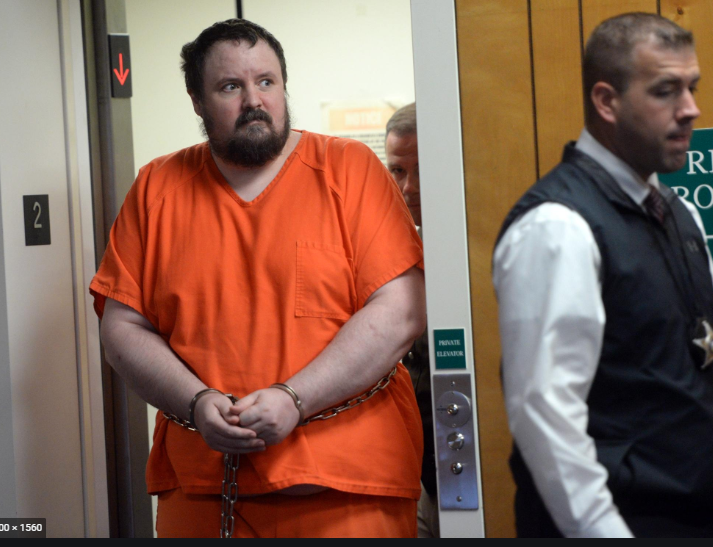By DAMIEN FISHER, InDepthNH.org
The man accused in the brutal slaying of two women is heading to trial again after the New Hampshire State Police investigator’s errors led to a mistrial.
And now, defense attorneys for Timothy Verrill want the jury members for the new trial to be able to consider the fact the State mishandled the evidence.
Verrill, is charged in the stabbing and beating deaths of Christine Sullivan, 48, and Jenna Pellegrini, 32, at the home of Dean Smoronk in Farmington where their bodies were found Jan. 27, 2017.
Sullivan lived with Smoronk and Pellegrini was a houseguest, according to court records. Verrill also allegedly tried to hide their bodies under the home’s porch and attempted to hide or destroy other evidence.
In what was later called a reprehensible violation of Verrill’s rights to a fair trial by the New Hampshire Supreme Court, prosecutors informed Verrill’s defense team three times during the original 2019 trial that significant evidence that contradicted the state’s case had been withheld from Verrill’s lawyers.
Judge Steven Houran ordered a mistrial in the case but refused to dismiss the charges on double jeopardy grounds. The New Hampshire Supreme Court upheld Houran’s rulings in a decision released last year and sent the case back for possible sanctions against the State and a new trial.
Verrill’s new trial is now set for October, and Verrill’s lawyers, public defenders Meredith Lugo and Julia Nye, want members of the next jury to be able to hold the mishandled evidence against the State.
According to a motion filed this month, Nye and Lugo are asking that new jurors be able to “draw an adverse inference against the State for its failure to provide significant discovery to the defense in a timely manner.”
Lugo and Nye also want jurors to be able to draw an adverse inference against the State for the way it delayed the investigation into the murders in order to hand the case over to Drug Enforcement Administration investigators who were looking into the alleged drug dealing.
Lugo and Nye say that decision to let the DEA take the lead resulted in the defense getting locked out from evidence and witnesses that could be important to the case.
Nye and Lugo also want the State to be barred from using transcripts from the first trial to impeach witnesses, and they want prosecutors to be forced to stick to their original theory of the case. Verrill’s team also wants the State to pay for additional investigation they did based on the withheld evidence.
Houran found that the mistakes in withholding the evidence were the result of poor police work and sloppy record keeping, and not an intentional plan. This view was affirmed by the Supreme Court.
“The (Major Crimes Unit) has no designated procedures for compiling a casebook and offers no formal training on the subject,” the ruling states. “Additionally, the MCU has no centralized records management system. The lead MCU investigator assigned to this case used a spreadsheet to track investigator assignments and testified that if he inadvertently excluded an investigative task from his spreadsheet, he would have no indicator or reminder to follow-up on the task’s completion. In other words, a failure to record an item onto the spreadsheet would likely result in a failure to collect the item,” Houran wrote.
Prosecutors said at trial that Verrill thought one of the women was a police informant. Sullivan had been involved with Dean Smoronk and defense attorneys proffered the theory that the murders were connected to an attempted expansion of the drug business with a motorcycle club.
Some of the evidence that the State Police initially did not turn over to prosecutors included the discovery involving the alleged drug trafficking, which was handled separately from the murder investigation, according to the Supreme Court order.
Last year, one of the State’s key witnesses in the murder trial, Josh Colwell, escaped prison time in a federal drug dealing after he took a plea deal.
Both Colwell and Verrill were members of the Mountain Men Motorcycle Club, an organization known to deal drugs, according to court records. Verrill and Colwell were involved in dealing drugs together under their boss, Smoronk, court records state.
During the 2019 murder trial, Colwell testified about being the last person to see Verrill before the murders, and the first person to see him after the murders. Colwell testified that a visibly intoxicated Verrill told him that he thought Pellegrini, who was living in Sullivan’s house, was a police informant. After Verrill allegedly killed the women, he went to Colwell’s house where he acted suspiciously, Colwell testified. Colwell and Smoronk later drove to the house and discovered Pellegrini’s bloody mattress.
Colwell was the sergeant at arms of the Mountain Men, according to testimony brought out during the trial. As such, he was responsible for collecting debts.
Colwell was busted by agents with the United States Drug Enforcement Agency in 2018 for dealing methamphetamine. He faced up to 20 years in prison for the convictions, according to court records, though the probation department recommended between 30 and 37 months in prison.





